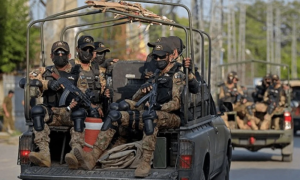ISLAMABAD: The intricate tapestry of India’s relations with Afghanistan explains New Delhi’s tone of betrayal and skepticism. The echoes of past disappointments reverberate as India is accused of a perpetual pattern of betrayal, seen by many as rooted in an alleged anti-Muslim stance.
This sentiment challenges the notion of camaraderie between India and the Islamic nation of Afghanistan, stating that the rhetoric of solidarity from the Indian side falls short when measured against the stark realities on the ground.
The recent closure of the Afghan embassy in New Delhi, the shuttering of Afghan schools, and the obvious shift towards engaging with the Taliban all paint a vivid picture of Delhi’s evolving stance towards Kabul, casting a shadow of disillusionment upon the hearts of many Afghans.
The diplomatic mission of Afghanistan in India, led by former ambassador Farid Mamundzay, closed last month due to “pressure from both the Taliban and the Indian government to relinquish control.” The insufficient support from India had made the mission incapable of meeting the expectations of approximately 32,000 Afghan nationals in the country.
India’s historical alignment with the Northern Alliance and its persistent anti-Taliban stance have raised doubts about its reliability as a partner for Afghanistan. Several key historical incidents underscore these doubts, such as India’s perceived betrayal of its ally, Afghan President Najibullah, leading to his assassination in 1996.
India has consistently portrayed the Mujahideen and Taliban as terrorists, labeling Afghanistan as a safe haven for terrorists on the international stage and forums. Prior to August 2021, Delhi utilized Afghan soil to pursue its strategic interests against Pakistan and China under the patronage of the Northern Alliance.
Furthermore, India continued to perpetuate anti-Afghan and anti-Muslim sentiments through its Hindi cinema, depicting Muslims and particularly Pashtoons as terrorists, criminals, drug dealers, and smugglers. In the critical aftermath of August 2021, a time when Afghans needed support the most, India allegedly took actions contrary to its trusted ally status.
This included the cancellation of visas for fleeing Afghans, denial of visas to Afghan students enrolled in Indian universities, and refusal to extend visas to anti-Taliban diplomats in the Afghan embassy in Delhi.
The processing of Afghan visa requests by India has also been criticized for religious discrimination. Hindus and Sikhs from Afghanistan reportedly received more support to relocate to India, while opportunities for Muslim Afghans remained limited. Additionally, India does not officially recognize Afghans in the country as refugees, categorizing them as illegal migrants under the Foreigners Act of 1946. Consequently, Afghans in India face socio-economic challenges, lacking the right to employment, education, or healthcare facilities.
In light of these actions, both Pakistan and Afghanistan should be cognizant of any potential disruptions in their ties, as they could create an opportune moment for India to re-enter Afghanistan and engage in a diplomatic double game.


























